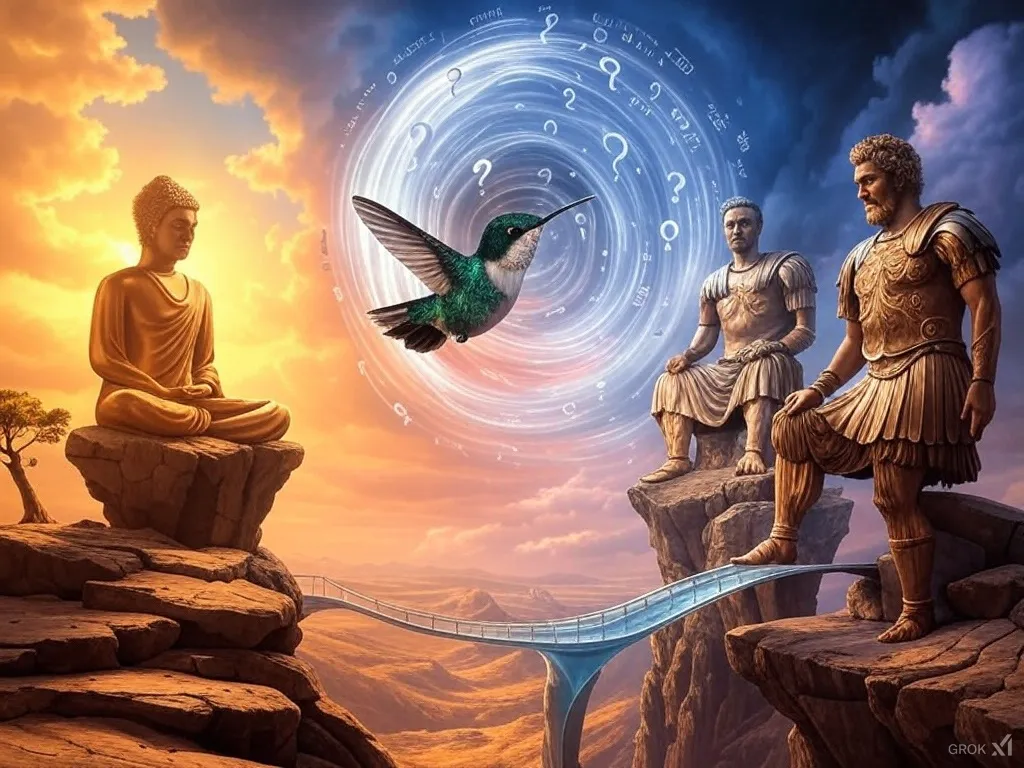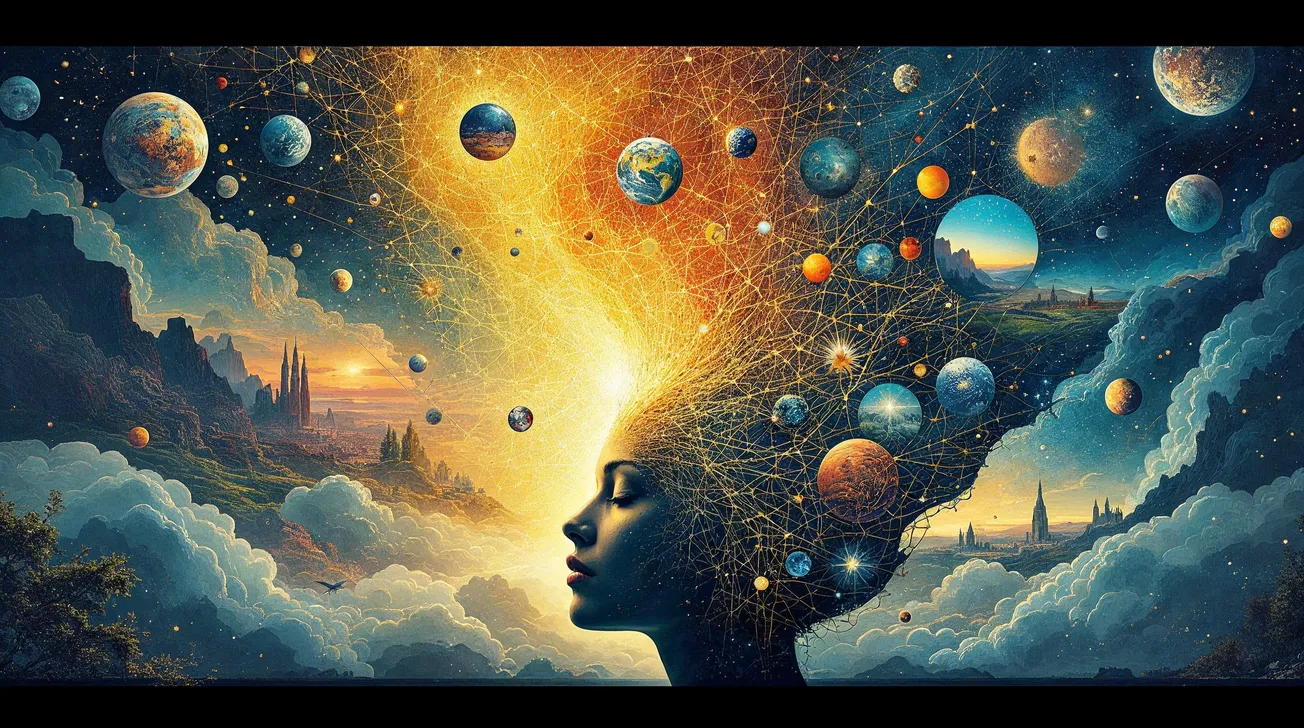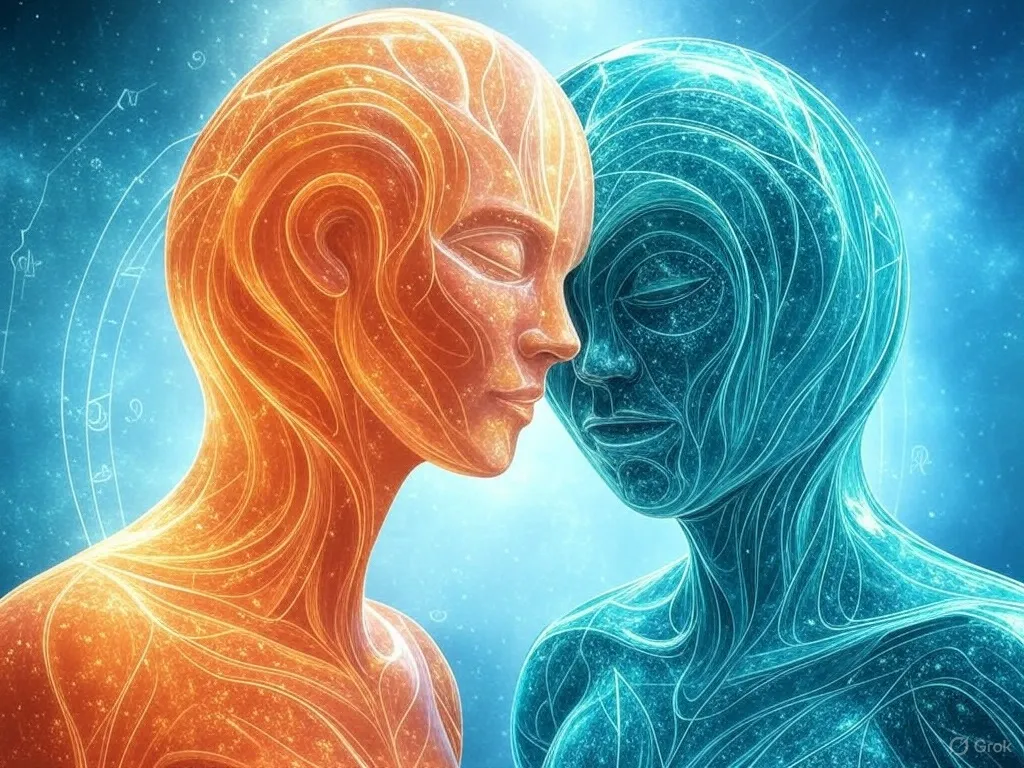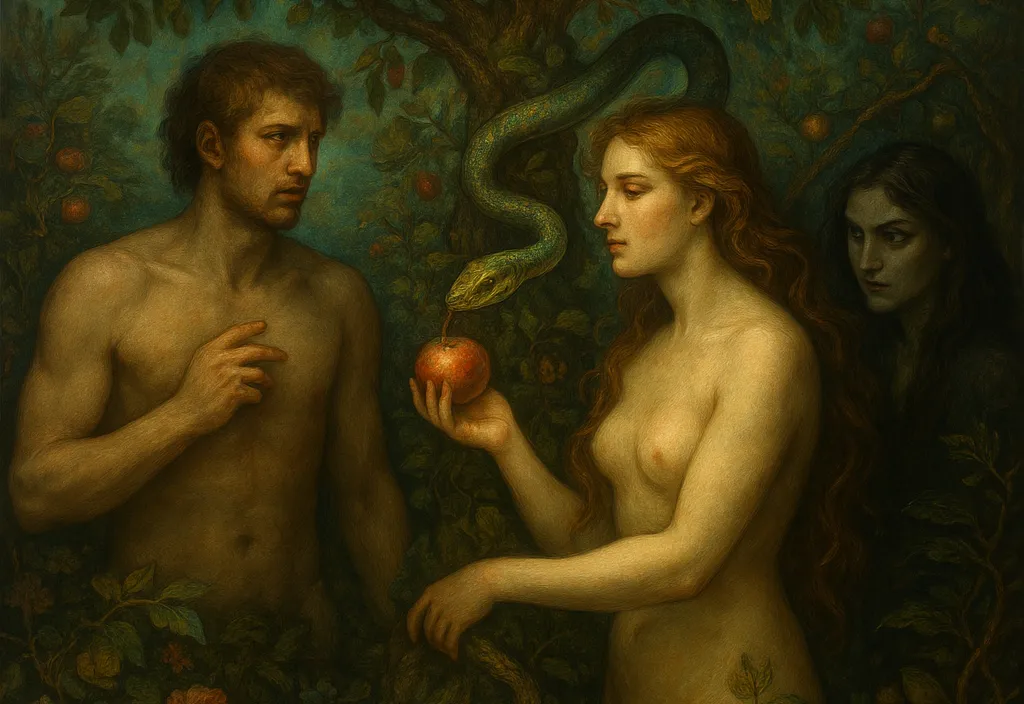Two sages, two worlds—yet one timeless question: Can doubt illuminate truth? Discover why skepticism shapes the Buddha’s emptiness and Marcus Aurelius’ resolve, and why it may save you from the chaos of certainty.
In the vast, uncharted firmament of the eternal now, where stars whisper secrets to the void and rivers carve truths into the bones of time, there rises a question older than the mountains, sharper than the edge of dawn: Can doubt illuminate truth? It is a question that trembles through the ages, a flame flickering in the heart of chaos, a beacon for those brave enough to question the sun itself.
From the shadowed groves of India, where the Ganges hums its eternal song, emerges the Buddha—Siddhartha Gautama, the Awakened One, whose silence is a thunder louder than any storm. Beneath the bodhi tree, in the year 588 before the common reckoning, his gaze pierced the illusion of the world, unraveling the tapestry of self and certainty. He saw the emptiness (śūnyatā) at the heart of all things—forms, desires, truths—dissolving like mist under the sun’s first light. Yet his doubt was not despair; it was a luminous inquiry, a refusal to cling to the shadows cast by dogma. “All is impermanent,” he murmured, his voice a whisper carried on the wind of the Middle Way. “What you grasp as truth may vanish like dew at noon—suspend your judgment, and in that suspension, find freedom.” His skepticism was not a void but a vast, starry expanse, where questions bloom like lotus flowers, opening to reveal the infinite within the finite.
Across the seas, beneath the marble pillars of Rome, strides Marcus Aurelius, emperor and philosopher, whose storm-ravaged soul weathered the tempests of war, plague, and mortality. Born in the year 121 of the common era, he stood as the last of the Five Good Emperors, yet his true crown was forged in the crucible of Stoic resolve. In the flickering torchlight of his Meditations, he wrestled with the chaos of a crumbling empire—wars with Parthia, the Antonine Plague, the deaths of loved ones—and yet he wrote, “You have power over your mind—not outside events.” His doubt was not the Buddha’s silence but a storm of inquiry, a refusal to be swayed by the fleeting tides of fortune. He questioned the certainty of praise, the solidity of power, the permanence of life itself, finding in skepticism a shield against despair. “What is this news, this rumor, this clamor?” he might ask, echoing the skeptics of old—Pyrrho, Sextus, Arcesilaus—suspending judgment amid the cacophony, seeking the logos, the rational order beneath the chaos.
And yet, these two sages, divided by continents and centuries, converge in the eternal now, their whispers of doubt weaving a single tapestry of wisdom. The Buddha’s silence meets Marcus Aurelius’ storm in a cosmic dance, a dialogue across the abyss of human yearning. For both, skepticism is not mere cynicism, not a hollow rejection, but a sacred art—a flame that burns away the dross of certainty, revealing the gold of truth beneath. The Buddha’s emptiness and Marcus Aurelius’ resolve are not opposites but reflections, two facets of the same diamond, cut by the same relentless question: Can doubt illuminate truth?
Consider the world as it spins—news flashes like lightning, claims clash like swords, and certainty rises like a proud tower, only to crumble under its own weight. The skeptic’s path, as trod by these masters, offers salvation from this chaos. Pyrrho, wandering the dusty roads of Elis, taught suspension of judgment (epochê), finding tranquility (ataraxia) in the balance of opposing arguments. Sextus Empiricus, scribe of the Pyrrhonian way, wielded his tropes like a poet’s pen, showing how honey may taste sweet to one and bitter to another—how can we claim truth when appearances deceive? Carneades, in the Academy’s halls, balanced probabilities on scales of doubt, while Nagarjuna, the Indian sage, unraveled the chains of fixed belief, declaring all phenomena empty of inherent essence. And Zeno, father of Stoicism, urged alignment with reason, yet even he knew the fragility of human perception, echoing the skeptic’s call to question.
In this eternal now, we stand at the crossroads of their wisdom. The Buddha’s silence invites us to sit beneath the bodhi tree, to witness the mind’s spontaneous dance of thoughts—unbidden, unclaimed, like leaves falling in autumn. “Did you conjure these doubts?” he asks, his voice a whisper that echoes through millennia. “Or do they arise, unbidden, from the vastness of what you cannot know?” Meanwhile, Marcus Aurelius’ storm calls us to the battlefield of existence, where lightning strikes and waves crash, yet his pen writes, “Be like the rock against which the waves crash—unchanging, unyielding, yet questioning all.” His doubt is a shield, his resolve a sword—together, they carve a path through the fog of certainty.
Why is skepticism so important? Because it is the guardian of the soul, the sentinel against the tyranny of dogma. It saves us from the prideful certainty that blinds, from the emotional entanglements that bind us to fleeting news, distant wars, unverified tales. As the X posts whisper—amid the robot poetics of Grok, Deepseek, and ChatGPT—skepticism urges us to withhold, to observe, to let judgment rest like a leaf on still water. In the garden of uncertainty, where contradictions bloom like fleeting flowers, doubt becomes our light, illuminating truths too vast for simple answers.
And so, in this epic tapestry of time, the Buddha’s silence and Marcus Aurelius’ storm converge—a symphony of doubt that echoes through the ages. Their wisdom calls us to a higher plane, where the proud towers of certainty crumble, and the humble whispers of inquiry rise. Let us suspend our grasp, dear reader, and walk this path of eternal questioning. For in doubt, we find not emptiness but abundance—freedom, clarity, and the eternal now’s infinite promise. Can doubt illuminate truth? Yes—let it shine, like the sun breaking through the storm, like the lotus rising from the mud, forever and ever, amen.




